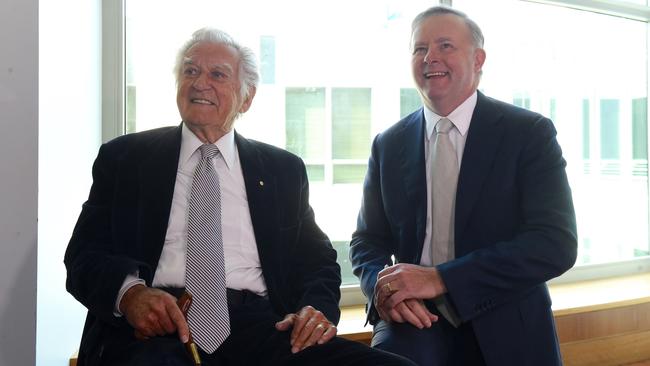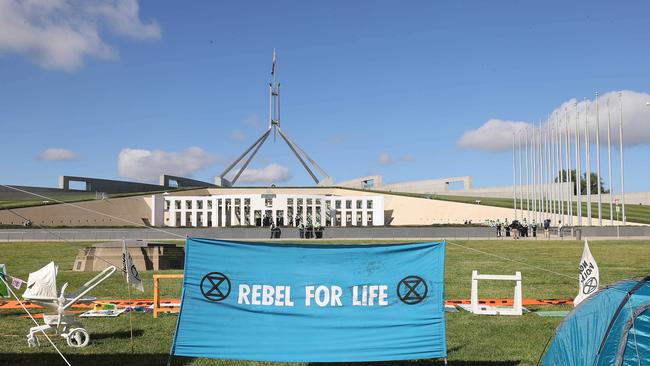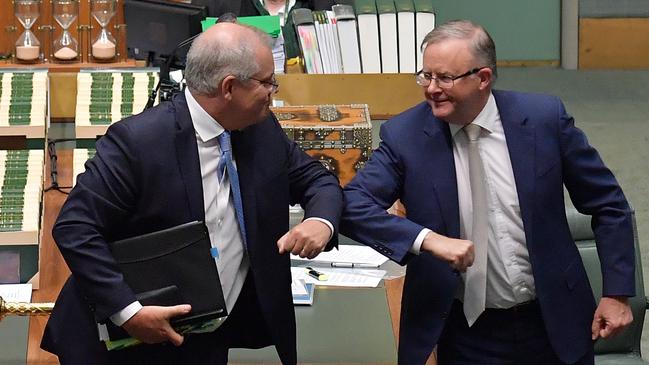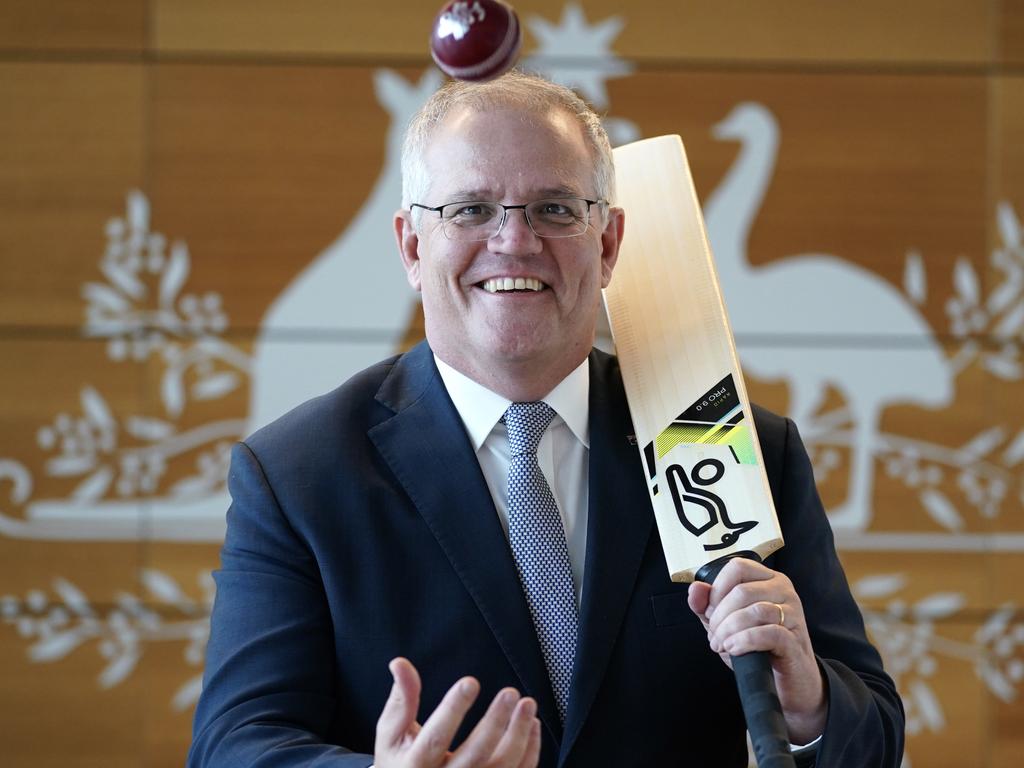It’s time for Anthony Albanese to consign Gough Whitlam to history
Labor’s only chance to win power at the 2022 election is to reject its traditional reformist zeal and ideological activism - and stick to the mainstream.

Half a century on, the “It’s time” campaign still stirs the passions of Labor supporters. Last week, Albanese tweeted an old photo of himself with Whitlam to mark the 49th anniversary of that victory. ALP types tend to see Whitlam’s consigning of the stale and (by then) discombobulated conservatives into opposition – and immediately implementing a broad and radical agenda – as the high point of post-war Labor.
That it all ended in tears just three years later never seems to temper their admiration. Bitterness over the Dismissal and disdain for Malcolm Fraser and John Kerr seems to overwhelm any self-awareness or analysis of the Whitlam government’s faults.
The salient point for Albanese and his team is not to embrace the revolutionary zeal of the Whitlam ascension – 1972 was the outlier, the exception that proves the rule. It was a different time, the world was changing, and the “It’s time” theme spoke more about leaving the old behind rather than endorsing every aspect of Whitlam’s vast progressive agenda.
Labor has won back government only twice since then, and both times it offered a mainstream, rather than activist, agenda. Bob Hawke and Paul Keating succeeded in government for more than a dozen years by maintaining a largely mainstream bearing; Kevin Rudd won on a Howard-lite platform but lost his way because he failed to stick to it.

The way to win power in Canberra and govern effectively is to stick firmly to mainstream ground rather than embrace ideological activism. The proof that this is not a partisan disposition came in the 1993 election when, for all his economic baggage, Keating was able to see off the Liberals because John Hewson offered an imposing, economic rationalist “Fightback” agenda.
It is impossible to clearly define mainstream values but the governing parties need to comprehend the boundaries and not test the tolerance of voters. Unlike so many political practitioners, mainstream voters tend not to subscribe to political ideologies or embrace policies that are ideological indulgences.
Australia’s mainstream leans centre-right on topics such as individual liberty, small government, support for small business, national security and defence, and choice in health and education, while leaning to the centre-left on issues such as Medicare and a social safety net.
For almost nine years now, the Coalition has governed as a divided and unsettled team but has performed relatively well on the fundamentals of economic management, national security and pandemic response. Scott Morrison will be the first prime minister since John Howard to last from one election to the next, placing stability at the core of his message.
After the predictably messy final sitting fortnight of parliament, and the possibility of more provocative behaviour from renegades if parliament returns in February, this might seem counterintuitive, but Morrison and Treasurer Josh Frydenberg will be able to claim world’s best performance in pandemic fatality rates, vaccination levels and economic resilience. It is a good story to tell, and they will argue that changing horses will jeopardise the recovery.
A wise Labor approach would seek to capitalise on the “It’s time” argument to say goodbye to Coalition incertitude and infighting but promise only incremental change on policy fundamentals. Yet, as ever, the ideologues will want to promise more on climate change, social services, and wealth redistribution, while offering ambivalence on national security and the alliance.

Albanese hails from the Socialist Left and faces the dual challenges of keeping the aspirations of his own faction at bay, while masquerading as mainstream. His lifelong political disposition would be to embark on a Whitlamesque reform agenda but he needs to act more like Hawke.
This week, Albanese tweeted an old photo of himself with Hawke, and the young Albo looked decidedly surly compared to the smiling visage in his Whitlam picture. While his tweet called Hawke a “great man” he did not list off policy achievements as he did with his earlier Whitlam post.
Still, the Labor leader is aware of this dichotomy and his campaign will aim to be more Hawke than Whitlam. Albanese is quick to point out that Hawke launched his biography in 2016 when Bill Shorten was leader.
After Labor overplayed its hand in 2019, promising a raft of tax changes and more radical climate action, it intends to make itself a smaller target this time. But already it is clear that its main political differentiation will occur in its most vulnerable areas – climate policy and national security.
Less than two years ago, Albanese said Labor’s 2030 emissions reduction target of 45 per cent had been a “mistake” because it was rejected as too drastic and costly by voters at the 2019 election. So how can a 43 per cent target, with three fewer years to be implemented, be only a “benefit” to the national economy?
Labor is left to make an implausible argument. Albanese says his policy is “both realistic and ambitious” as he claims it will generate 600,000 jobs, increase power supplies, and reduce electricity prices.
This magic pudding economics is backed by modelling that is about as flimsy as a house of cards; job creation numbers are based on an investment boost from companies taking advantage of cheaper electricity – an unlikely virtuous circle.
Labor’s climate spokesman Chris Bowen is sounding more like Greta Thunberg than an alternative cabinet minister: “The world’s climate emergency is Australia’s jobs opportunity.” He should be careful with such alarmist language and sanguine economics, especially as he was the Treasury spokesman spruiking taxation upheaval in 2019 and telling voters that if they did not like it they could vote Liberal.
They did. And talk of radical policies to tackle a “climate emergency” might convince them this time too. Especially when we are told it can all be fixed for free.
The hysterical language on climate is an attempt to ensure the debate is emotive rather than rational, shielding Labor from proper cost/benefit analysis of its policy. A rational assessment is problematic for Labor; its target must cost more to deliver, even with much of it hidden as “electricity infrastructure investment”.
The additional costs inevitably will fall on taxpayers and consumers, and they will be a dampener on economic activity. Modelling provides poor cover because voters know all too well that models have been consistently wrong in other spheres, such as global warming and pandemic progress.
It is better to look at experience, and our push towards renewables so far has increased prices, reduced energy security, and hoovered up at least $30bn in additional government spending. The same mix has triggered energy crises in California, the UK and Europe.
And still, despite the costs and risks, we know environmental benefits will be either minuscule or non-existent because global emissions will continue to rise, driven mainly by increased emissions from China.
Bowen argues the higher target (with attendant spending and energy system upheaval) will ensure Australia is no longer stuck in the “naughty corner” at global climate conferences. This gives the game away; this is a radical policy designed not to advance our national interests but to pursue Labor’s globalist ambitions.
Imagine the mindset that sees the posturing, pontificating and abject failure of Copenhagen and Glasgow, yet wants Australia to be more at home in that company. For all these reasons, Labor again is open to attack over climate.
But the argument is not as clear-cut as in previous elections because the Morrison government has adopted net zero by 2050, its 2030 emissions reductions forecasts are as high as 35 per cent, and state Liberal governments have targets matching Labor’s, which are endorsed by major corporates and business groups including the Business Council of Australia.
Morrison will need to deftly point out the gap between emissions-reduction goals and the reality of energy technology, affordability and reliability. He should argue that Labor’s is a big government, big unions and big business approach while the Coalition’s more cautious approach protects the interests of households and small business.
As we have already started to hear, the Labor/Greens nexus will also worry voters. Regardless of what happens in the lower house, Labor will not be able to govern without Greens co-operation in the Senate, so we can expect Adam Bandt to leverage any Labor climate plans upwards.
If Labor is wise, this climate extravagance will be the only ideological policy it takes to the election. The Coalition’s pandemic spending and record deficits have taken the fiscal pressure off Labor, so it should be able to avoid tax fiddles to fund other programs.
More challenging for Albanese might be putting the China genie back in the bottle, after Paul Keating, Bob Carr and others have made Labor vulnerable over kowtowing to Beijing.
On this, too, he will need to draw more from Hawke than he does from Whitlam.







This time next year, we will have been hearing plenty about a major political anniversary – 50 years since Gough Whitlam hauled Labor into power after 23 years in the wilderness. By then, more than six months on from the 2022 election, we will know whether Anthony Albanese has emulated Whitlam or failed to learn the right lessons from Labor’s post-war electoral experiences.